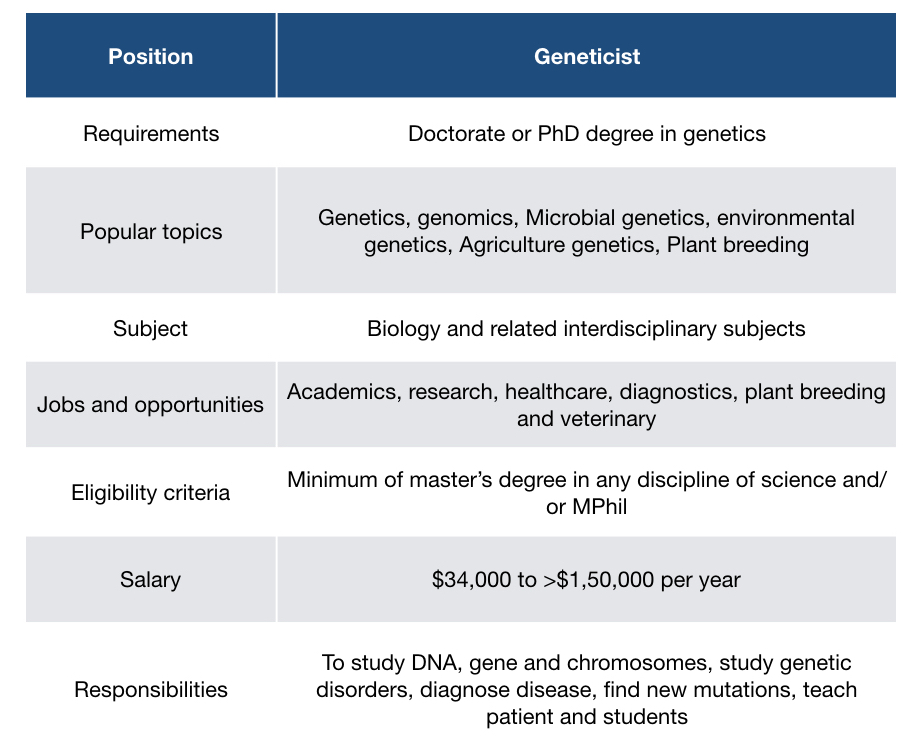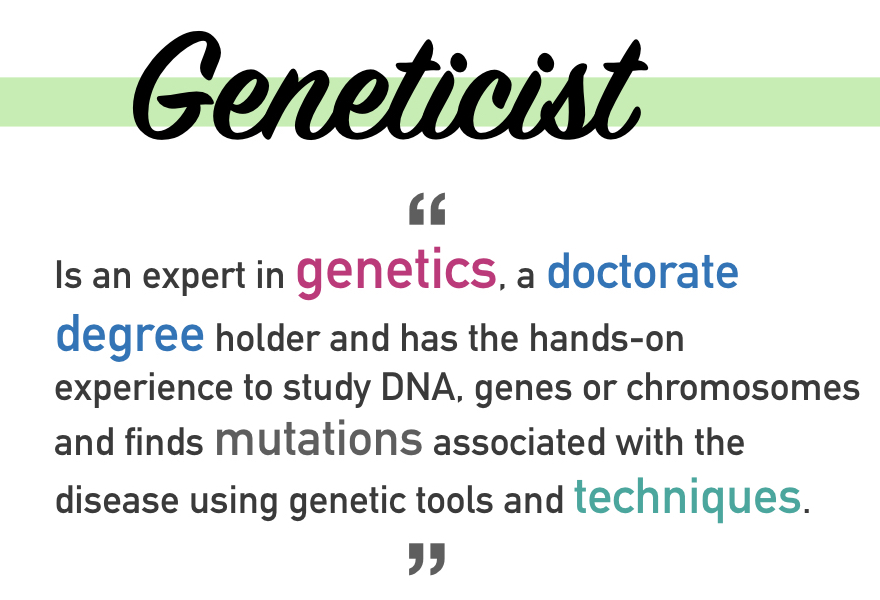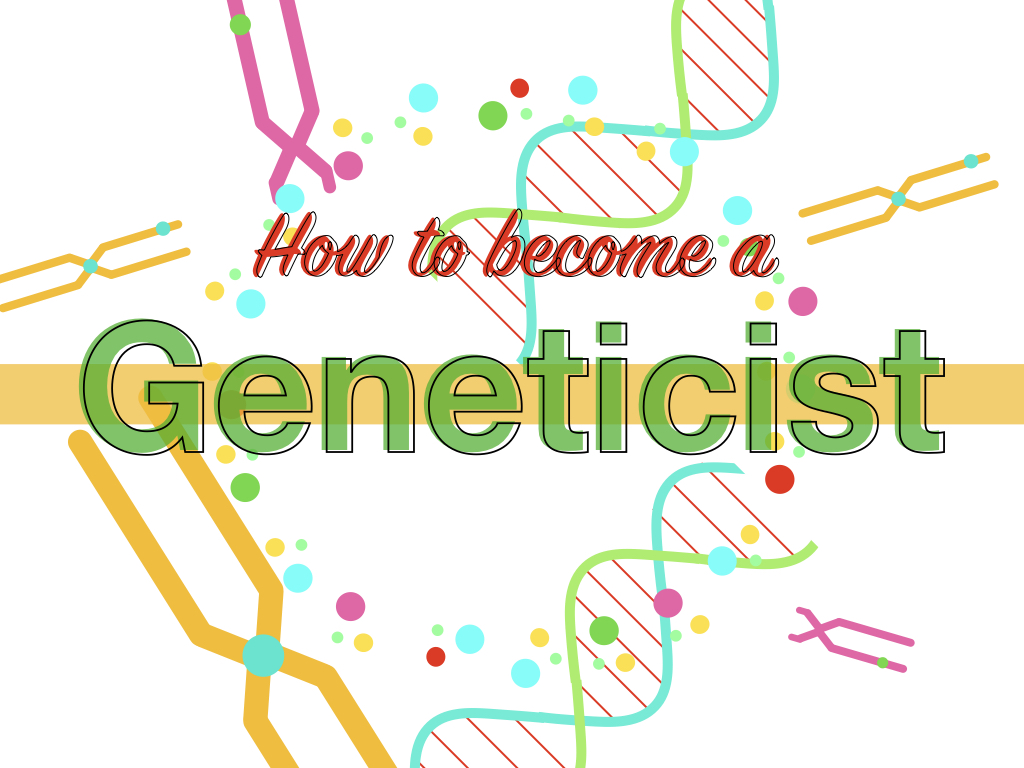A geneticist is a professional or expert in genetic studies like the inheritance of traits, genes, DNA or chromosomes, who are PhD degree holders and can work in research, academics, healthcare and many other sectors.
To understand the role of a geneticist, first, we need to learn about genetic science a bit! Genetic science or genetics, studies DNA, genes, chromosomes, mutations and other related things.
It’s an interdisciplinary branch of science that conducts studies at a molecular level. Their experts usually work in laboratories and perform extensive research on a cell or DNA level. DNA- deoxyribose nucleic acid is a nucleic acid and a building block of life that decides every trait of us. And studying DNA reveals many things related to an organism.
Genetic tools and techniques like a polymerase chain reaction, DNA sequencing and DNA microarray are used to study various parameters of a nucleic acid of either human, plant, animal or microorganism.
Techniques of genetic science also utilized in clinical diagnosis and agriculture. A genetics graduate or doctorate expected to use their skills, expertise and experience to improve present knowledge. The present article is focused on the role of geneticist and what are the requirements to become one of them.
Read more: PhD in Nursing- Eligibility Criteria, Admission, Process, Salary and Opportunities.
Who is a geneticist?
A geneticist is a professional or an expert in genetic science that study the inheritance of traits, DNA and chromosomes. He or she is a specialist of an interdisciplinary part of science- genetics.
They carry a higher degree in a related field, have experience and worked on techniques relevant to it. They have varied roles in their field depending on their expertise.
In medicine or medical science, a geneticist studies the genetics of a disease, its inheritance pattern and associated health problems practicing their advanced knowledge. Furthermore, they diagnose the conditions, perform genetic tests and interpret results.
They find mutations related to the disease or congenital condition and try to find the inheritance pattern and likelihood of occurrence in the next generation.
Geneticist studies epigenetic factors as well to know alterations associated with several common conditions, for example, studying genotypes associated with diabetes and its predispositions in population.
In microbiology, they study microorganisms, their genetics and pathogenic activities. Scrutinizing microorganism’s evolution, life cycle and role in disease development can also be a part of the geneticist’s duty.
Environmental geneticist studies gene-environment interactions, how genes turned “on” or “off” under the influence of certain environmental factors.
Plant geneticist studies plant genetics, the inheritance patterns of various plant genes and plant disorders. Through their research knowledge, they conduct genetic engineering experiments and improves plant quality by altering plant DNA or genome. The objectives of plant research are to produce economically important plants.
Besides, geneticists also conduct genetic engineering experiments to treat disease, eliminate harmful genotypes and produce genetic medicines.
A genetic counselor, the most important person in medical science helps people to understand various genetic conditions. Their role is to educate people, patients, doctors or researchers on particular genetic conditions.

Definitions:
A geneticist is an expert in genetics, a doctorate degree holder and has the hands-on experience to study DNA, genes or chromosomes and finds mutations associated with the disease using genetic tools and techniques.
Or
a geneticist is an expert who designs, explains, suggest, performs and interpret the genetic test or DNA test.
Or simly,
Someone who studies genetics (DNA, gene, chromosome or genome) with best of their knowledge is known as geneticist.
[Read more: List of doctorate degrees in Science, Fine arts, Commerce and Computer.]
Education requirements:
Any science graduate can be a geneticist. However, applicants must have a master’s degree in their relevant field. As it is an interdisciplinary field of science, any biology graduate can apply for a geneticist degree.
To be a geneticist one must need to have a PhD degree in genetics or a doctorate in the same. Note that some universities only allow genetic degree holders for awarding doctorates.
Besides, the applicant must have an excellent research background- publications, research articles and dissertation. MPhil along with the master’s degree also taken into consideration for awarding the degree.
PhD in genetics:
As we said any biology or science student can apply for PhD in genetics, although, graduation in cell biology, biotechnology, microbiology or genetics are highly recommended.
The process of PhD admission in genetics is equivalent to other PhD degrees, the candidate needs to complete the course work after admitting into the degree followed by extensive wet and dry lab research.
A candidate researches their topic by conducting experiments to check various hypotheses and publish their research in the form of a dissertation or thesis. Prospective candidate needs to defend their thesis at the terminal of the degree.
Doctorate in genetics:
The doctorate in genetics is a similar kind of degree much like the PhD in genetics, despite, an expert can get a doctorate in genetics degree. They prepare themself for unlimited research or diagnosis. They either are practitioners or researchers having to work for improving present knowledge.
The requirements for getting the present degree is same as PhD in genetics, note that research background of applicant and their previous experience should be taken in to account.
The dissertation or thesis viva aren’t commonly required here.
Further reads:
- PhD Horizons: Exploring Career Paths Post-Doctorate
- 8 Criteria To Select The Best PhD Coaching
- 20 Amazing Websites and/or Resources For PhD Students
- What is Scientific Writing? + Features + Examples
- Determination is the Motivation– A PhD story of Khushbu Trivedi
Jobs and opportunities:
There are plenty of various options for a doctor of genetics or geneticist are available in which research and academics are so common. They can start their career by entering into any research organization or academics.
They also works in various research laboratories, as a professor, tutor, in hospitals and diagnostics.
In academics, they can work as a lecturer, professor or dean of the institute where they teach students, prapapers researcher and PhD candidates and teach various techniques.
Meanwhile, they can conduct research projects as well, and strengthen their background, avail grants for the institute and provide knowledge in the science fraternity by publishing their work.
Medical, healthcare and diagnostic are also some of the options for the medical geneticists. They can work as a scientist, genetic counselor, genetic expert or diagnostic expert.
They treat and diagnose genetic disorders as well as monitor predispositions and progress of cancer as well. Infectious disorders are also studied by them.
As a scientist, geneticists can work in biotechnology, environmental science, microbiology, ecology, physics, chemistry and computer field. Some most popular positions of geneticist and their roles are explained here:
Genetic expert:
Advice a genetic test, tech various techniques and conducts research to improve knowledge in genetics.
Medical geneticist:
Study DNA, genes, mutations or chromosomes in order to identify the health conditions or disease associated with it. The medical geneticist also performs diagnostic tests for various disorders. They study the inheritance of traits.
Plant geneticist/ plant breeders:
Plant genetic experts experiment on plant genome, alter it, replace genes, insert ploidies to produce various economically important and biotic/abiotic stress-resistant plant species.
Animal geneticist:
An animal geneticist is a specialized veterinary scientist that also experiment animal genome to study disease, mutations, genes and to find out their evolutionary relations.
Clinical scientists:
Clinical scientist in genomics, immunology, microbiology or endocrinology studies various disorders, disease or problems associated with it and find out their genetic causes, if any.
Research scientist:
Research scientist performs works on various research projects of organizations using their skills and techniques. Their goal is to find knowledge and avail grants and financial aids for the organization.
Amazing article: What is DSc- Doctor of Science?- Process, Requirements, Eligibilities, Duration, Subject & Syllabus, Jobs & Opportunities and Salary.
Salary and income:
Genetics is the most specialized field of science, less students choose to go. A geneticist can earn a decent and handsome salary or earn more than a biologist, by getting expertise in a specific technique.
On average, a geneticist can earn between $34,590 to $1,25,000 in the USA. Here are some of the salary comparisons for various posts.
| Position | Salary (USA) per year | Salary (India) per year |
| Genetic counsellor | $68,000 to $96,000 | 3,45,000 to 7,00,000 |
| Geneticist | $1,59,339 to $1,94,895 | 4,00,000 to 10,00,000 |
| Genetic engineering expert | $74,000 to $95,000 | 4,00,000 |
| Profesor or lecturer | $79,000 to $1,04,039 | 3,60,000 to 8,40,000 |
| Genetic researcher | >$1,59,000 | 6,00,000 to 10,00,000 |
Note that the average salary may vary based on the institute, organization, company, research background of a scientist, publication, expertise and experience of the geneticist.
Where can they work?
- Genetic expert or geneticist at the hospital
- Genetic counselor
- Independent genetic counselor or expert
- Biotechnology industries
- Plant genetic research
- Plant breeding
- Animal husbandry and veterinary
- Bacteriology
- Virology
- Diagnostics
- Seed technologies
- Food industries
- Microbiology laboratories
- Environmental science
- Healthcare
- Biophysics
- Bioinformatics
- Biochemistry
- Immunology
- Agriculture and horticulture
- Plant tissue culture
- Medical research
- Clinical trial and research
Subjects and syllabus:
Common subjects and syllabus for genetics are explained here:
| Subject | Topics |
| Introduction to genetics-1 | Introduction to genetics, scope, history, mendelian genetics, branches of genetics and future. Inheritance of trait- autosomal dominant/ recessive, X linked dominant/ receive. |
| Introduction of genetics- 2 | Type of nucleic acid- DNA, RNA, protein, type of DNA, inheritance patterns, the study of the genome, chromosomes and genetic disorders |
| Genetic studies | Medical genetics, human genetics, microbial genetics, forensic genetics, plant genetics, animal genetics, environmental genetics, metagenomics, Prenatal genetics. |
| Genetic disorders | Type of genetic disorders- genetic disorders, chromosomal disorders, origins, inheritance pattern, Cystic fibrosis, Huntington’s disease, thalassemia, sickle cell anemia, Down syndrome, Patau syndrome, |
| Genetic mutations | Gene mutations, DNA mutations, Chromosomal mutation, deletions, duplications, insertion, translocations, SNPs, structural chromosomal alterations, numerical chromosomal alterations. |
| Microbial genetics | Study of bacterial or viral genome or related disorders |
| Plant genetics | Study of the plant genome, related disorders |
| Genetic techniques | PCR, DNA sequencing, DNA microarray, southern and northern blotting, agarose gel electrophoresis, PAGE. |
| Genetic engineering | Techniques, scope and future of genetic engineering, gene transfer techniques, rDNA technology, applications of genetic engineering and recombinant DNA technology |
| Other subjects | Gene environmental interactions, epigenetic alterations, genetic manipulation, gene editing genomics, evolution, gene testing and role of genetics in forensics. |
Role of a geneticist in forensic science:
Geneticists are in demands in recent times, organizations need, plant, animal, microbial, human or clinical geneticist. One can get a job at any organization easily, however, one of the most important roles of a geneticist is in forensic science.
Forensic scientist/ expert or geneticist performs a genetic test for criminal verification, crime scene investigation, parental and paternity verification and various other purposes.
DNA is a unique thing for a person, two people don’t have a similar DNA much life their fingerprint, in addition to this, DNA is present in almost all type of cells.
By taking a sample from the crime scene, criminal or target, the geneticist identifies the suspect. The test, known as the DNA or gene test performed from the sample.
Samples and suspects’ DNA are matched to get the results or link. The forensic DNA test is one of the most accurate, reliable and trusted DNA tests.
- Crime scene investigation
- Criminal verification
- Idenfication of suspect
- Paternal verification
- Maternal verification
- Idenfication of person
- Testing for child custody
Role of a geneticist in human genetics:
One of the most growing fields of medical science, in recent trends, is human genetics which focuses on the study of genetics and genomics of human and related disorders.
The aim of human genetics is to apply the knowledge of genetics to study, investigate and diagnose inherited genetic dirsoders using genetic techniques.
The human genetic expert screen genetic conditions, postnatal as well as prenatal, diagnose it, finds associated alterations, studies predisposition of genetic disorders or cancer, finds new genetic conditions or treat it using genetic engineering techniques.
They insert or remove the faulty or mutated DNA or gene and replace it with a healthy one by using various gene transfer techniques. They also find the prevalence of genetic disorders in order to prevent them.
One geneticist can choose human genetics as their research subject, get an excellent position in research, hospitals or organizations and earn a decent amount of money.

How to become a geneticist?
Now coming to the critical question of the present topic, how to become a geneticist? Let me first tell you that any biology graduate can apply to get a PhD degree in genetics, even, medicine students too.
To be an expert in genetics, first, you need good grades in graduation, a master’s degree and/ or MPhil degree in the related field. Graduates from Biology, botany, zoology, microbiology, plant physiology, biotechnology, environmental science, biostatistics, animal biology, cell biology, molecular biology and other allied science students can appear.
Only a doctorate degree holder is considered as a “geneticist” or “genetic expert” henceforth, in the next step, the candidate needs to get a PhD degree. for that, they need a master’s degree and completion of the entrance exam.
After getting admission in PhD, the candidate needs to complete their PhD or research work as like other PhD’s. They have to complete coursework, write a thesis, publish their research and defend their thesis. After getting a doctorate the candidate becomes a geneticist.
Process of becoming geneticist:
- Step 1: Completing Graduation in biology or related applied science
- Step 2: Completing a master’s degree or master’s dissertation and MPhil
- Step 3: publishing research and making a research background strong
- Step 4: completing a common entrance test for PhD or doctorate
- Step 5: cracking PhD interview
- Step 6: appearing into PhD and completing coursework
- Step 7: writing the doctorate thesis or dissertation
- Step 8: publishing the research or research article
- Step 9: completing PhD or defending the thesis
- Step 10: getting substantial experience in the genetics
More read: PhD Application Process and How to Write a PhD Application.
Geneticist near me:
Conclusion:
Genetics is one of the most uncommon and untraditional fields of biology, though very demanding. You need to master some skills and get a doctorate to be a geneticist. Geneticists from some reputed universities can even earn more money, reward and honor worldwide.
Watsons and Crick are two most popular name (who discovered the molecular structure of DNA) contributed tones in genetics after Mendel.
FAQs:
What is a geneticist?
A geneticist is a doctorate degree holder, an expert in genetics and an experienced person who studies the inheritance of traits, DNA, genes and chromosomes. Their role is to research, find new knowledge and provide healthcare. They perform various genetics tests on humans, animals and plants to identify them and find mutations.
What are the job options for geneticist?
A geneticist can get job in academics, research as well as diagnostics. They can work as a professor or lecturer in academics, scientist or researcher in animal husbandry, human diagnostics, healthcare virology, bacteriology, environmental science, plant science and agriculture. They can even work in forensic as forensic genetic experts.
What does a geneticist do?
A geneticist, who is an expert to study genetics does do DNA tests, gene or chromosome tests to find out alterations in the DNA, gene or chromosomes of an organism. They find mutations associated with the disease and use that data to prevent genetic disorders. They counsel patients to educate patients or students on genetics or disease.
How much does a geneticist earn?
The average salary of a geneticist is around $34,000 to $1,25,000 per year or 3,00,000 to 8,00,000 INR in India and United States, respectively. Although it may differ based on their experience, expertise and place they work.
Is a geneticist doctor?
Yes, if they have a PhD or professional doctorate degree in genetics.
What degree required to become a geneticist?
Any biology or medicine graduates or students or related applied science subjects can be a geneticist. A minimum of master degree and a doctorate degree is required to become a geneticist.
What kind of doctor is a geneticist?
The geneticist a professional doctorate or PhD degree holder or sometimes a doctor of medicine degree holder.
—-End of the article—-




